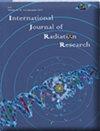深吸气屏气技术治疗左侧乳腺癌放疗患者心肺剂量的研究
IF 0.4
4区 医学
Q4 RADIOLOGY, NUCLEAR MEDICINE & MEDICAL IMAGING
引用次数: 0
摘要
背景:心脏疾病是左乳照射的危险因素之一。为了减少心脏毒性,不同的治疗技术适应呼吸周期阶段已经发展。本研究的目的是探讨自愿屏气技术在选定患者照射左乳房时的可行性。材料与方法:本研究纳入20例左侧乳腺癌患者。对每位患者进行两次计算机断层扫描(CT),一次使用自由呼吸(FB)技术,一次使用自主深吸气屏气(DIBH)技术。治疗方案采用场内场强度调制放射治疗技术。对心脏、左前降支(LAD)冠状动脉、同侧肺和对侧乳房进行剂量学比较。结果:DIBH技术使心脏平均剂量从7.7 Gy降至5.8 Gy, v20gy(%)从12.8%降至8.3% (p=0.009, p<0.001)。DIBH技术显示最大心脏距离明显缩短(2.0 cm vs 0.9 cm, p < 0.001), LAD平均剂量减少8.0%。同侧肺的D平均值从12.8 Gy降至12.2 Gy, v20gy(%)从25.6%降至22.8%。结论:在使用DIBH技术制定的治疗方案中,观察到传递到心脏的辐射剂量显著减少。为了降低影响左侧乳腺癌患者生存的心血管疾病的长期发病率和死亡率风险,应考虑采用DIBH等放射技术,特别是对绝经前患者。本文章由计算机程序翻译,如有差异,请以英文原文为准。
Investigation of cardiac and pulmonary doses in patients with left sided breast cancer treated by radiotherapy with deep inspiration breath hold technique
Background : Cardiac disease is a documented risk factor in left breast irradiation. In an attempt to reduce cardiac toxicity, different treatment techniques adapted to respiratory cycle phases have been developed. The aim of this study is to investigate the feasibility of the voluntary breath hold technique when irradiating the left breast in selected patients. Materials and Methods : The study included 20 patients with left sided breast cancer. For each patient, two computed tomography (CT) scans were acquired, one with the free breathing (FB) technique and one with the voluntary deep inspiration breath hold (DIBH) technique. Treatment plans were created using a field in - field intensity - modulated radiation therapy technique. A dosimetric comparison was made between the two techniques for the heart, left anterior descending (LAD) coronary artery, ipsilateral lung and contralateral breast. Results : The average of the mean dose of the heart decreased from 7.7 Gy to 5.8 Gy and V 20Gy (%) from 12.8% to 8.3% using the DIBH technique (p=0.009, p<0.001). The DIBH technique demonstrated significantly smaller maximum heart distance (2.0 cm vs. 0.9 cm, p < 0.001) and 8.0% reduction in LAD mean dose. Furthermore, D mean for the ipsilateral lung was reduced from 12.8 Gy to 12.2 Gy and V 20Gy (%) from 25.6% to 22.8%. Conclusions : In the treatment plans made using the DIBH technique, a significant reduction in the radiation dose delivered to the heart has been observed. In order to reduce long - term morbidity and mortality risks from cardiovascular disease affecting the survival of patients with left sided breast cancer, irradiation techniques such as the DIBH should be considered, especially for premenopausal patients.
求助全文
通过发布文献求助,成功后即可免费获取论文全文。
去求助
来源期刊

International Journal of Radiation Research
RADIOLOGY, NUCLEAR MEDICINE & MEDICAL IMAGING-
CiteScore
1.10
自引率
33.30%
发文量
42
期刊介绍:
International Journal of Radiation Research (IJRR) publishes original scientific research and clinical investigations related to radiation oncology, radiation biology, and Medical and health physics. The clinical studies submitted for publication include experimental studies of combined modality treatment, especially chemoradiotherapy approaches, and relevant innovations in hyperthermia, brachytherapy, high LET irradiation, nuclear medicine, dosimetry, tumor imaging, radiation treatment planning, radiosensitizers, and radioprotectors. All manuscripts must pass stringent peer-review and only papers that are rated of high scientific quality are accepted.
 求助内容:
求助内容: 应助结果提醒方式:
应助结果提醒方式:


